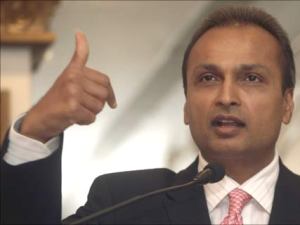 | « Back to article | Print this article |
 Alleging that Mukesh Ambani-led RIL was trying to wriggle out of gas supply contracts with NTPC and itself, Anil Ambani group firm RNRL asked the Supreme Court on Wednesday to make the power PSU a party to its ongoing case against RIL.
Alleging that Mukesh Ambani-led RIL was trying to wriggle out of gas supply contracts with NTPC and itself, Anil Ambani group firm RNRL asked the Supreme Court on Wednesday to make the power PSU a party to its ongoing case against RIL.
The move comes within days of RNRL approaching the apex court to become a party to the petition filed by NTPC against RIL that seeks quashing of the Bombay high court, which allowed the Mukesh Ambani group firm to amend its petition.
Listing out the details of NTPC's case, RNRL said: "RIL had adopted the same malafide design of inserting unsuitable terms in the respective gas supply agreements with RNRL and NTPC to renege from its binding obligations.
"This was as a result of pure commercial greed in as much as the gas prices had started rising."
Both RNRL and NTPC are seeking gas from RIL's KG-D6 fields at a price of $2.34 per mmBtu, while RIL now argues that the price needs government approval.
The pleadings come ahead of the commencement of final hearing on the matters by the Supreme Court on October 20.
RNRL and NTPC are taking the same stand to oppose the dishonest stand taken by RIL to avoid its obligation to supply gas to both the companies," the application by Reliance Natural Resources Ltd said.
It further added that the state-run power major had also stated in its petition that the decision of empowered group of ministers (on price approval) was without prejudice to the pending proceedings in RNRL and NTPC cases.
Both NTPC and RNRL have taken the stand that RIL's commitment is not affected by any decision by the government on gas utilisation or price and that the supplier was bound to give the PSU gas at a price of $2.34 per mmBtu for a period of 17 years.
RNRL said Reliance Industries Limited was seeking to deny supply of gas on the ground that the gas utilisation policy announced by the government in 2008 overrides the existing contracts.
"It is submitted that in case it is held that the existing contracts are over-ridden by gas utilisation policy or RIL is entitled to supply gas only at the price approved by the government, the suit filed by the NTPC would be rendered infructuous and NTPC would suffer a loss of over Rs 30,000 crore (Rs 300 billion)," the application noted.
RNRL also said that RIL would not even have submitted a bid in the international tender floated by NTPC in 2002 or committed gas supply to RNRL, if the gas supply was subject to any gas utilisation policy.
"RNRL and NTPC are taking the same stand to oppose the dishonest stand taken by RIL to avoid its obligation to supply gas to both the companies," the application by Reliance Natural Resources Ltd said.
It further added that the state-run power major had also stated in its petition that the decision of empowered group of ministers (on price approval) was without prejudice to the pending proceedings in RNRL and NTPC cases.
Both NTPC and RNRL have taken the stand that RIL's commitment is not affected by any decision by the government on gas utilisation or price and that the supplier was bound to give the PSU gas at a price of $2.34 per mmBtu for a period of 17 years.
RNRL said Reliance Industries was seeking to deny supply of gas on the ground that the gas utilisation policy announced by the government in 2008 overrides the existing contracts.
"It is submitted that in case it is held that the existing contracts are over-ridden by gas utilisation policy or RIL is entitled to supply gas only at the price approved by the government, the suit filed by the NTPC would be rendered infructuous and NTPC would suffer a loss of over Rs 30,000 crore (Rs 300 billion)," the application noted.
RNRL also said that RIL would not even have submitted a bid in the international tender floated by NTPC in 2002 or committed gas supply to RNRL, if the gas supply was subject to any gas utilisation policy.
Image: Anil Ambani